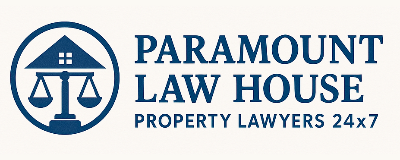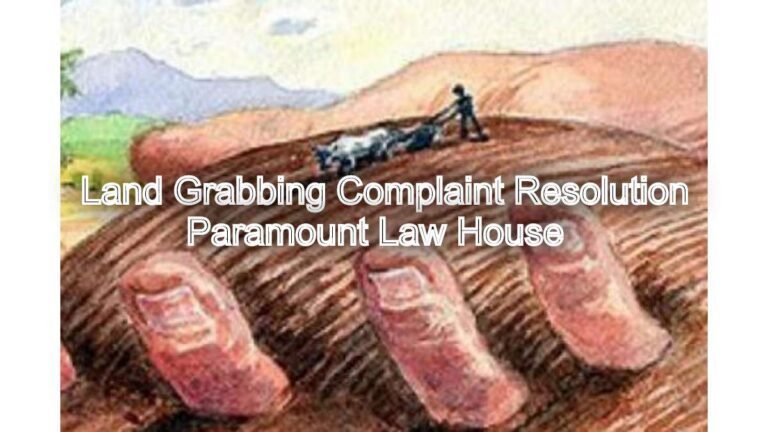Family Settlement Suit Representation: Experienced Lawyers
Family Settlement Suit Representation: Family disputes can be incredibly sensitive. Indeed, they involve deeply personal relationships. Property matters often exacerbate these tensions….
Family Settlement Suit Representation: Family disputes can be incredibly sensitive. Indeed, they involve deeply personal relationships. Property matters often exacerbate these tensions. They can complicate emotional bonds. Therefore, achieving a peaceful resolution is paramount. Prolonged conflict can tear families apart. Legal intervention often becomes necessary. It helps formalize delicate settlements. Such intervention ensures enforceability. Paramount Law House, your trusted Property Lawyers 24×7, specializes in these complex cases. We provide expert Family Settlement Suit Representation. We meticulously guide families towards amicable solutions. Stand ready to offer unparalleled legal expertise. We diligently work to protect your interests and preserve family harmony.
Family Settlement Suit Representation: Experienced Lawyers: Paramount Law House
Understanding Family Settlement Suits
Firstly, grasping the fundamental concept of Family Settlement Suits is crucial. It defines a specific legal mechanism.
1. Definition of a Family Settlement
A Family Settlement is a legal arrangement. It resolves property disputes among family members. It typically involves a mutual agreement. This agreement specifies the division of property. It clarifies rights and interests. For instance, it aims to prevent future conflicts. Consequently, it formalizes understanding within the family.
2. Distinction from Partition Suits
It is important to distinguish Family Settlement Suits from Partition Suits. A Partition Suit is a formal lawsuit. The court imposes a division of property. Conversely, a Family Settlement focuses on mutual consent. It reflects an amicable understanding. For instance, the family decides the terms itself. Consequently, it is a consensual approach, not a litigious one.
3. Purpose: Preserve Family Harmony
The primary purpose is clear. It aims to preserve family harmony. Avoids protracted litigation. It saves time and resources. For instance, it allows families to resolve disagreements privately. Consequently, it prioritizes peaceful coexistence.
4. Applicability to Properties
This mechanism applies to various types of property. It includes ancestral property. It also covers self-acquired property. This is true if such property is held jointly by family members. For instance, it can cover both movable and immovable property. Consequently, its scope is broad.
5. Key Stakeholders
All family members with a legitimate claim are key stakeholders. This includes all legal heirs. It may involve co-parceners in ancestral property. For instance, their consent is vital for a valid settlement. Consequently, comprehensive inclusion is necessary.
Why Formal Family Settlement is Crucial
Secondly, recognizing the undeniable benefits of a formal Family Settlement is crucial. It provides long-term security.
1. Preventing Future Disputes
A legally binding agreement minimizes ambiguity. It clarifies property shares. It defines respective rights. For instance, it prevents future misunderstandings. Consequently, it acts as a safeguard against renewed conflicts.
2. Ensuring Clear Title and Ownership
A proper settlement establishes clear title to properties. It confirms specific ownership. This is vital for future transactions. For instance, it simplifies sale or transfer of property. Consequently, it provides legal certainty.
3. Avoiding Protracted Litigation
Court battles are notoriously expensive. They are also incredibly time-consuming. Family Settlement Suits aim for out-of-court resolutions. This saves significant financial resources. For instance, it avoids emotional drain. Consequently, it offers a more efficient path.
4. Preserving Family Relationships
Litigation often damages family bonds irreparably. A consensual settlement facilitates amicable resolution. It promotes understanding. For instance, it prioritizes mutual respect. Consequently, it helps maintain familial ties.
5. Tax and Succession Planning Benefits
A well-executed settlement aids in future tax planning. It simplifies succession planning. It clarifies beneficiaries. For instance, it can optimize tax implications for inherited assets. Consequently, it supports prudent financial management.
Key Elements of a Valid Family Settlement
Thirdly, understanding the essential components of a valid Family Settlement is paramount. These elements ensure its legal enforceability.
1. Voluntary Agreement and Consent
All parties must provide free consent. The agreement must be voluntary. It should be free from any fraud or coercion. For instance, undue influence invalidates the settlement. Consequently, genuine willingness is indispensable.
2. Fairness and Equity
The terms of the settlement should be just. They must be equitable for all stakeholders. No party should feel unduly disadvantaged. For instance, a balanced distribution promotes acceptance. Consequently, perceived fairness enhances durability.
3. Clarity of Terms
The agreement must be crystal clear. It must specify details of property division. It defines rights and obligations. For instance, ambiguity can lead to future disputes. Consequently, precise language is vital.
4. Registration (if applicable)
For immovable property, registration is often mandatory. This is under the Registration Act, 1908. A registered deed provides legal proof. For instance, an unregistered deed might have limited evidentiary value. Consequently, proper registration safeguards interests.
5. Implied Consideration
A Family Settlement typically does not require monetary consideration. The mutual relinquishment of rights by other family members serves as implied consideration. For instance, it ensures reciprocity. Consequently, it establishes legal validity.
6. Absence of Fraud/Coercion
The agreement’s validity hinges on its integrity. It must be free from any misrepresentation. It must not be induced by threats. For instance, a settlement obtained through deceit can be challenged. Consequently, ethical conduct is paramount.
The Process of Family Settlement Suit Representation
Fourthly, understanding the systematic process of Family Settlement Suit Representation guides clients through complexities. This ensures a structured approach.
1. Phase 1: Initial Consultation and Assessment
The process begins with a detailed consultation. Lawyers understand the client’s objectives. They gather all property details. They review crucial documents like title deeds and mutation records. For instance, they assess the family tree and relationships. Consequently, this diagnostic phase identifies legal complexities.
2. Phase 2: Mediation and Negotiation
Lawyers facilitate communication. They mediate discussions among family members. Explore common ground. They aim for an amicable resolution. For instance, they draft initial proposals for consideration. Consequently, they strive for out-of-court settlements.
3. Phase 3: Drafting the Settlement Deed/Agreement
This is a critical step. Lawyers meticulously draft the Settlement Deed. It outlines all terms and conditions. Ensures legal enforceability. It includes clauses for future contingencies. For instance, obtaining signatures of all consenting parties is essential. Consequently, precise drafting minimizes future disputes.
4. Phase 4: Registration of the Settlement Deed
When immovable property is involved, registration is crucial. This adherence to the Stamp Duty and Registration Act is mandatory. Lawyers guide clients through the registration process. For instance, they ensure all formalities are completed. Consequently, registration provides undeniable legal proof.
5. Phase 5: Filing a Consent Decree/Suit (if necessary)
If all parties agree, the settlement can be presented to court. The court passes a consent decree. This gives the settlement the force of a court order. For instance, it makes the terms legally binding and enforceable. If a full agreement is not reached, a formal partition suit might be filed, still aiming for partial settlement. Consequently, this provides judicial backing.
Complexities in Family Settlement Suits
Fifthly, anticipating common challenges in Family Settlement Suits helps lawyers prepare robust strategies. These complexities demand expert handling.
1. Undefined Property Shares
This is common in ancestral properties. Shares may not be clearly demarcated. It requires detailed analysis of succession laws. For instance, the Hindu Succession Act defines rights. Consequently, determining clear shares is often complex.
2. Minor’s Interest
Settlements involving a minor’s interest require special care. Court approval is often mandatory. The court must ensure the settlement is in the minor’s best interest. For instance, a guardian ad litem might be appointed. Consequently, protecting minors’ rights is paramount.
3. Absence of Clear Wills
When a deceased family member leaves no clear Will, intestate succession laws apply. This can complicate property division. It might involve numerous legal heirs. For instance, interpreting statutory provisions is crucial. Consequently, the absence of testamentary disposition adds complexity.
4. Disputed Valuations
Family members may disagree on property valuations. This is a common hurdle. Independent valuations might be needed. For instance, reaching a mutually agreeable figure is vital. Consequently, fair valuation is key to consensus.
5. Emotional Attachments
Deep emotional attachments to properties can hinder rational negotiation. Sentimental value often outweighs monetary worth. This can make compromise difficult. For instance, an experienced mediator helps navigate these sensitivities. Consequently, empathy is crucial.
6. Jurisdictional Issues
Properties might be spread across different geographical locations. This can lead to jurisdictional issues. Determining the correct court or tribunal is essential. For instance, multiple legal proceedings might be required. Consequently, complex asset dispersion adds challenges.
Why Experienced Lawyers are Indispensable
Sixthly, partnering with experienced lawyers is non-negotiable for successful Family Settlement Suits. Their expertise is invaluable.
1. Legal Expertise
Experienced lawyers possess deep knowledge. They understand property laws. Master succession laws. They are experts in family law. For instance, they interpret complex statutes like the Hindu Succession Act. Consequently, their legal acumen ensures sound advice.
2. Mediation Skills
Family disputes are highly emotional. Skilled lawyers act as neutral mediators. They de-escalate tensions. They facilitate constructive dialogue. For instance, they help parties find common ground. Consequently, their mediation skills promote amicable outcomes.
3. Drafting Precision
A Settlement Deed must be legally sound. It must be comprehensive. Experienced lawyers draft with precision. They ensure clarity. They prevent future ambiguities. For instance, they incorporate all necessary clauses. Consequently, meticulous drafting is vital for enforceability.
4. Court Procedure Mastery
If a consent decree is sought, court procedures apply. Experienced lawyers master the Civil Procedure Code (CPC). They navigate court filings. They handle hearings effectively. For instance, they ensure all legal formalities are met. Consequently, their procedural knowledge is invaluable.
5. Protecting Client’s Interests
Lawyers advocate firmly for their client’s rights. They ensure fairness and equity. They prioritize the client’s long-term interests. For instance, they provide unbiased advice. Consequently, they act as a steadfast guardian of your position.
6. Tax Implications
Settlements have tax implications. This includes stamp duty, registration fees, and potential capital gains tax. Experienced lawyers advise on these financial aspects. For instance, they help minimize tax burdens legally. Consequently, they offer comprehensive financial foresight.
Paramount Law House: Property Lawyers 24×7
Finally, Paramount Law House stands as your dedicated legal partner. We offer specialized expertise in Family Settlement Suits.
1. Specialization in Property Law
Our firm is highly specialized. We focus intently on property law. This includes all aspects of family settlements. For instance, our expertise covers both ancestral and self-acquired property. Consequently, our specialization is your strength.
2. Extensive Experience in Negotiation and Mediation
We bring vast experience to the table. Our lawyers are skilled negotiators. They are compassionate mediators. They work tirelessly for amicable resolutions. For instance, they navigate complex family dynamics with sensitivity. Consequently, our approach prioritizes peace.
3. Meticulous Drafting of Deeds
We ensure precise drafting. We prepare comprehensive Settlement Deeds and agreements. They are legally sound. They are enforceable. For instance, our attention to detail prevents future disputes. Consequently, accurate documentation is guaranteed.
4. Expertise in Registration Procedures
We guide clients through the entire registration process. This includes compliance with Stamp Duty laws. We handle all formalities under the Registration Act, 1908. For instance, we ensure your deed is legally recognized. Consequently, proper registration safeguards your interests.
5. Strong Courtroom Representation
If a consent decree is sought, we provide strong courtroom representation. Our lawyers advocate effectively. They ensure the court formally recognizes the agreement. For instance, they navigate civil procedures seamlessly. Consequently, our presence ensures judicial validation.
6. Client-Centric and Accessible
We prioritize our clients’ peace of mind. Offer a client-centric approach. We are available 24×7 for urgent matters. For instance, we provide constant support and communication. Consequently, our accessibility defines our commitment.
Frequently Asked Questions
A Family Settlement Suit is a legal mechanism designed to resolve property disputes among family members through mutual agreement. Unlike a Partition Suit where a court might impose a division, a family settlement aims for an amicable, consensual arrangement regarding the distribution of ancestral or jointly held self-acquired property.
Formalizing a Family Settlement with a legal document, often a Settlement Deed, is crucial for several reasons. It prevents future disputes by clearly defining property shares and rights, ensuring clear title and ownership.
Yes, it is often mandatory to register a Family Settlement Deed, especially if it involves immovable property. This requirement falls under the Registration Act, 1908. Registration provides legal proof of the settlement, makes it legally enforceable, and ensures its validity against future claims. An unregistered deed might have limited evidentiary value in court.
Common complexities include undefined property shares, especially in ancestral properties, making clear demarcation difficult. The involvement of a minor’s interest also adds complexity, as court approval is often required to protect the minor’s rights. Furthermore, disputes over property valuations, the absence of clear Wills (intestate succession), and strong emotional attachments to properties can significantly complicate negotiations.
Paramount Law House, as Property Lawyers 24×7, offers comprehensive assistance for Family Settlement Suits. Their experienced lawyers provide legal expertise in property law and succession law, skilled mediation for amicable resolution, and meticulous drafting of legally sound Settlement Deeds. They also guide clients through the crucial registration process and provide strong representation if a consent decree is sought in court, all with a client-centric approach prioritizing family peace.
Conclusion
Family property disputes are inherently sensitive and often complex. However, a well-executed Family Settlement Suit, facilitated by experienced legal counsel, offers a clear path to amicable resolution and long-term harmony. This process demands a deep understanding of property law, succession law, and the nuances of family dynamics, coupled with strong negotiation and drafting skills. Paramount Law House, your dedicated Property Lawyers 24×7, stands ready to provide this comprehensive support. By meticulously guiding clients through the assessment, negotiation, drafting, and registration phases, we protect your interests, ensure legal enforceability, and ultimately foster peace within families, turning potential conflict into a structured, consensual agreement.
Read More
- Gift Deed Drafting: Expert Assistance for Property Transfer
- Hire Purchase Agreements: Ensure Legal Compliance
- House Owner Tenant Issue Resolution: Legal Support Available
- Housing Development Law Experts: Navigate Legal Frameworks
- Illegal Possession of Immovable Property: Legal Remedies Available
- Department of Justice, Ministry of Law and Justice:






